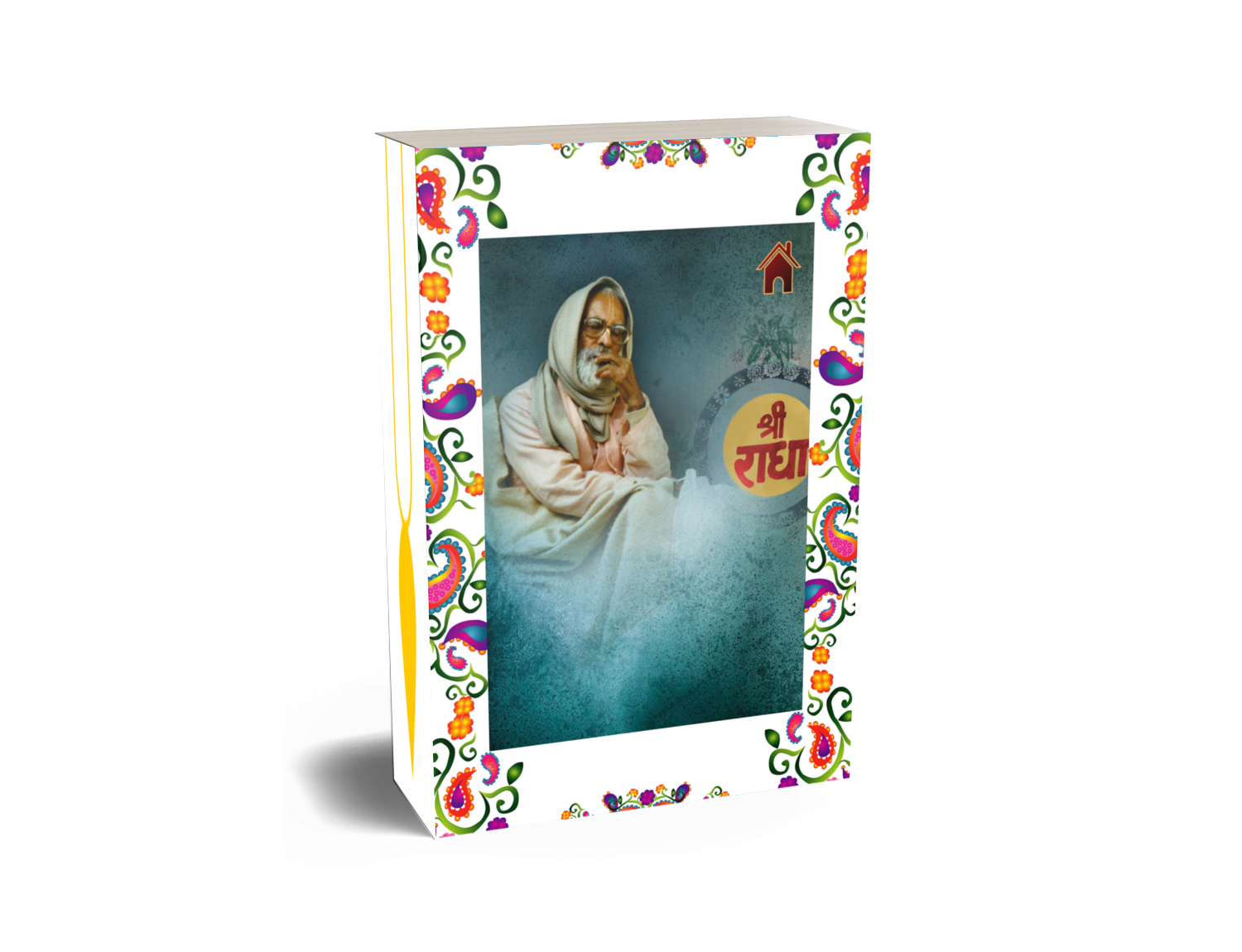

The following is an excerpt from a class by Śrīla Bhaktivedānta Nārāyaṇa Mahārāja at Śrī Keśavajī Gauḍīya Maṭha in Mathurā, India, on January 7, 1992, published in Śrī Hari-kathāmṛta, Volume Two
In the lives of Vaiṣṇavas there is no consideration of their caste or creed. Sanātana Gosvāmī wrote somewhere concerning himself, “By keeping bad association I have become a Muslim, a mleccha, and a bigger sinner than Jagāi and Mādhāi.” He used these humble words to describe himself. Vaiṣṇavas don’t lie; they are called parama-satya, supremely truthful. Because Sanātana Gosvāmī wrote this about himself, some people may believe that truly he was a fallen mleccha and an untouchable. They may think, “Sanātana Gosvāmī cannot lie, so it must be true.” Is what Sanātana Gosvāmī has written here correct or incorrect? He has only written in this way in order to instruct the conditioned souls. In material existence the most detestable person is he who maintains pride in his bodily conception of life. I am this body, I am a brāhmaṇa, I am a kṣatriya, I am a merchant, I am beautiful, I am very qualified, I am pure, I am a scholar—for those who identify themselves in this way, this identification is evidence of their lowliness. Whoever has this mentality is very fallen. So Sanātana Gosvāmī wrote as he did in complete sincerity, and in his behaviour this was also evident. He would not enter the Jagannātha Mandira in Puri, thinking, “If I even touch the dust that lies on the path leading into the temple, then that dust will touch the devotees as they go inside and they will be contaminated.” So he never entered the temple. He stayed far away at the bhajana-kuṭira of Haridāsa Ṭhākura and from a distance offered prostrated obeisances to the cakra atop the temple’s spires.
Some people believed that Sanātana Gosvāmī was of a low caste and a fallen Muslim. Therefore, Jīva 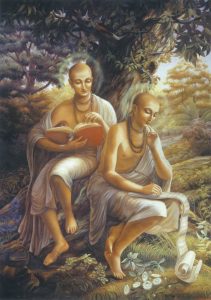 Gosvāmī wrote in his Laghu-vaiṣṇava-toṣaṇī commentary on the Śrīmad-Bhāgavatam that Sanātana Gosvāmī was a high standard bharadvāja-gotra brāhmaṇa from Karnataka. So he was actually a brāhmaṇa, but what relation does this have to the soul? It is only a mundane identification. It may have some value from the material perspective, but it has no spiritual meaning. If Nārada Ṛṣi took birth in a low caste family, what difference does it make? But mundane people give this consideration more importance, and for this reason Jīva Gosvāmī wrote about Sanātana Gosvāmī’s high birth. He wrote that Sanātana Gosvāmī was a great scholar and having come from what was practically a royal lineage, was like a king. In that lineage of wealthy brāhmaṇas came a gentleman named Sarvajña who had two sons named Harihara and Rūpeśvara. Harihara was an expert in weapons and Rūpeśvara was an expert in knowledge of the scriptures. When Sarvajña died, Harihara employed his military expertise, seized the province and exiled his brother Rūpeśvara. Rūpeśvara’s son was Padmanābha, and Padmanābha’s fifth son was Mukunda. Mukunda resided in Naihati near Chinchura in West Bengal, and his son was named Kumāradeva. Kumāradeva had five sons: two older boys, then came Santosh, Amara and Vallabha, who later became Sanātana, Rūpa, and Anupama. All of them were big scholars straight from childhood. It is not mentioned anywhere that either Rūpa or Sanātana ever married; only Anupama married and his son later became Jīva Gosvāmī. All three brothers were employed by the Muslim ruler. Sanātana was the prime minister, Rūpa was the private secretary, and Anupama was the treasurer. They all met Caitanya Mahāprabhu when he came to Rāmakeli, where they lived.
Gosvāmī wrote in his Laghu-vaiṣṇava-toṣaṇī commentary on the Śrīmad-Bhāgavatam that Sanātana Gosvāmī was a high standard bharadvāja-gotra brāhmaṇa from Karnataka. So he was actually a brāhmaṇa, but what relation does this have to the soul? It is only a mundane identification. It may have some value from the material perspective, but it has no spiritual meaning. If Nārada Ṛṣi took birth in a low caste family, what difference does it make? But mundane people give this consideration more importance, and for this reason Jīva Gosvāmī wrote about Sanātana Gosvāmī’s high birth. He wrote that Sanātana Gosvāmī was a great scholar and having come from what was practically a royal lineage, was like a king. In that lineage of wealthy brāhmaṇas came a gentleman named Sarvajña who had two sons named Harihara and Rūpeśvara. Harihara was an expert in weapons and Rūpeśvara was an expert in knowledge of the scriptures. When Sarvajña died, Harihara employed his military expertise, seized the province and exiled his brother Rūpeśvara. Rūpeśvara’s son was Padmanābha, and Padmanābha’s fifth son was Mukunda. Mukunda resided in Naihati near Chinchura in West Bengal, and his son was named Kumāradeva. Kumāradeva had five sons: two older boys, then came Santosh, Amara and Vallabha, who later became Sanātana, Rūpa, and Anupama. All of them were big scholars straight from childhood. It is not mentioned anywhere that either Rūpa or Sanātana ever married; only Anupama married and his son later became Jīva Gosvāmī. All three brothers were employed by the Muslim ruler. Sanātana was the prime minister, Rūpa was the private secretary, and Anupama was the treasurer. They all met Caitanya Mahāprabhu when he came to Rāmakeli, where they lived.
Jīva was the only son of the three brothers, so he received abundant affection. Rūpa was always especially affectionate towards Jīva and treated him as if he were his own son. When Jīva was very young Rūpa took him to Mahāprabhu and Mahāprabhu blessed Jīva by placing his hand on Jīva’s head. During childhood Jīva studied, and soon he learned all logic, Sanskrit grammar and theistic philosophy from the books in his father’s home. Before Rūpa and Anupama left household life to retire in Vṛndāvana, they divided all the family’s wealth and property. Half of it they donated here and there, one-quarter of it they gave to the members of their household and one-quarter of it they deposited with a merchant. This deposited money was later used by Sanātana Gosvāmī to bribe his way out of jail. Both the giving and taking of bribes is bad, but if required for bhakti, even a 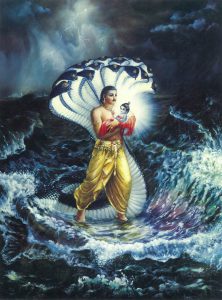 detestable activity is good. Stealing and lying and so forth are immoral, but even a soul as great as Vasudeva told a lie. He took Kṛṣṇa to Gokula and later told Kaṁsa that his wife had given birth to a daughter. So Sanātana Gosvāmī eventually used that money to bribe his way out of jail. At the time of dividing the family’s wealth, a sufficient amount was left for Jīva to continue his studies. All three brothers realised he was the only son in their dynasty, so they nurtured him with great affection and also made sure he had whatever material facility he required.
detestable activity is good. Stealing and lying and so forth are immoral, but even a soul as great as Vasudeva told a lie. He took Kṛṣṇa to Gokula and later told Kaṁsa that his wife had given birth to a daughter. So Sanātana Gosvāmī eventually used that money to bribe his way out of jail. At the time of dividing the family’s wealth, a sufficient amount was left for Jīva to continue his studies. All three brothers realised he was the only son in their dynasty, so they nurtured him with great affection and also made sure he had whatever material facility he required.
Jīva had a very soft nature, and as he grew older gradually began worshipping deities of Rādhā-Kṛṣṇa. Making garlands for them and offering pūjā to them in different ways, he would become immersed in meditation. He never played games with other children. When he became a little older, perhaps fourteen years, Jīva went to Navadvīpa. By then Mahāprabhu had returned to the spiritual world, and all the residents of Navadvīpa had left and gone elsewhere. Everywhere they looked brought painful remembrance of Mahāprabhu. They saw the ghāta where he bathed, the house where his mother lived, and so on. Because Navadvīpa now brought them all great sadness, Śrīvāsa Paṇḍita, Advaita Ācārya and everyone else left there and Navadvīpa became deserted. A few days earlier Nityānanda Prabhu had arrived at Śrīvāsa-aṅgana from Khardaha. When Jīva Gosvāmī arrived there, Nityānanda Prabhu was very pleased to meet such a beautiful young boy. Nityānanda Prabhu placed his feet on Jīva’s head and said, “I came here just to meet with you; otherwise I would have stayed in Khardaha.” Next he showed Jīva all the places of Mahāprabhu’s pastimes in Navadvīpa. Then he showed Jīva great mercy by ordering him to go stay with Rūpa and Sanātana in Vṛndāvana.
On the way to Vṛndāvana, Jīva stopped in Varanasi, where he met a disciple of Sarvabhauma Bhaṭṭācārya named Madhusūdana Vacaspati. Madhusūdana Vacaspati was teaching Vedānta there, but not the commentary of Śaṅkarācārya, which was famous at that time. Mahāprabhu had earlier refuted that commentary when Sarvabhauma Bhaṭṭācārya tried to teach it to him. Then Mahāprabhu instructed Rūpa and Sanātana at Prayaga and Varanasi on the real purport of Vedānta. Madhusūdana Vacaspati was a great scholar, and having studied and understood everything which Mahāprabhu had taught Rūpa and Sanātana, was teaching it there. Sarvabhauma Bhaṭṭācārya knew many years before that Mahāprabhu would be going to Vṛndāvana and that he would therefore have to stop in Varanasi on the way, so he thought that they should make Varanasi a suitable holy place for Mahāprabhu. For this reason he had previously placed his disciple Madhusūdana Vacaspati there. So Jīva Gosvāmī would have already been informed of Madhusūdana Vacaspati’s presence there by Nityānanda Prabhu or someone else; otherwise, how would he have known of him? Jīva Gosvāmī went to his home and learned all bhakti-vedānta from him. He also learned Śaṅkarācārya’s commentary, because without learning it, he would have been unable to refute it. After studying all of this and fully understanding it, he proceeded to Vṛndāvana.
There Sanātana Gosvāmī placed him in the care of Rūpa Gosvāmī and he stayed nearby Rūpa Gosvāmī’s hut at the Rādhā-Dāmodara Mandira. Rūpa Gosvāmī would read to Jīva Gosvāmī everything he was writing. One day while they were in the midst of reading together, an effulgent elderly brāhmaṇa arrived there. We know from his age and his scholarship that this must have been Vallabhācārya, and he knew Rūpa Gosvāmī from the time when Mahāprabhu was in Prayaga. He was approximately the same age as Advaita Ācārya, so Rūpa Gosvāmī would have been the appropriate age to have been his son or even younger. He said, “Rūpa, what are you writing these days?”
Hesitating a little, Rūpa Gosvāmī replied, “I am writing a book entitled Bhakti-rasāmṛta-sindhu.”
Then Vallabhācārya picked up the book and turning the pages, said, “Very good, I will look through it and correct any errors.”
At that time Jīva Gosvāmī was fanning Rūpa Gosvāmī with a leaf from the tāla tree. In previous times disciples received the fortunate opportunity to render services like this to their gurus. Present-day gurus don’t require this type of service from their disciples. Soon they may even come out with a machine that will massage the guru’s feet and perhaps they will even invent a contraption that will cook for the guru. In this way there will no longer be any need or opportunity for disciples to render these intimate services to the guru. Eventually the relationship between guru and disciple will simply not be the same; we see it happening somewhat already. So Jīva Gosvāmī was fanning Rūpa Gosvāmī, but when he heard Vallabhācārya say this, he could not tolerate it and went to do something else. After some time he took a waterpot and went to the river to fetch some water. There he met Vallabhācārya, who was just finishing his midday bath. Jīva Gosvāmī said, “Gosaījī, you said before that you would proofread the Bhakti-rasāmṛta-sindhu that Rūpa Gosvāmī is writing. If you have found any errors, precisely where are they?”
Vallabhācārya replied, “What will you understand, child? Have you studied Sanskrit grammar?”
“Yes, a little.”
“Then what will you possibly understand?”
“But please just show me any errors you have detected.” When Vallabhācārya showed him an apparent error, a fierce debate commenced between them. Eventually Jīva Gosvāmī established the point in such a way that Vallabhācārya could not refute it and he could not give any answer.
When Vallabhācārya returned to the hut, he asked Rūpa Gosvāmī, “Who was that boy who was fanning you? He is very intelligent and extremely learned in the scriptures.”
Very humbly and with folded hands Rūpa Gosvāmī replied, “He is the son of my younger brother and also my disciple. He does not know how to behave.”
“No, he is a genius and in the future he will be very famous.”
Soon afterwards Vallabhācārya left and Rūpa Gosvāmī thought that there was a problem. When Jīva Gosvāmī arrived with the water, Rūpa Gosvāmī said to him, “You don’t have even enough tolerance that you started quarrelling with an elderly, scholarly brāhmaṇa who came to proofread something for my own good? Your nature is not entirely correct; go away from here.”
Jīva Gosvāmī could never disobey his order. If one disobeys his guru, he will never be able to enter into spiritual life. If someone says, “Gurudeva, don’t you know me? Don’t you know how I am living and what I am doing?” So what is this? Where is such a person’s faith in their guru? The guru knows all and he should be seen as non-different from Bhagavān. Even a madhyama-adhikārī guru can “take a disciple’s pulse” and tell him many things. Once a man went to see an ordinary doctor. Just by seeing how thin the man was, the doctor concluded that his digestion was disturbed. So this doctor closed his eyes and pretended to feel the man’s pulse. Then he said, “Your digestion is not working well—is that right?” The man nodded in agreement. “You have some gas pains here?” The man replied, “Yes.” And upon hearing the doctor describe other symptoms, the man thought, “Oh, this doctor knows everything.”
In the same way the madhyama-adhikārī guru is like a doctor. Merely by looking at someone’s face he can tell what the shortcomings are in that person’s spiritual life. Then what to speak of what a more elevated guru can see and know? He can “take our pulse” and tell us everything about ourselves. Don’t ever think that the guru is an ordinary person like myself and that he doesn’t know the feelings within my heart. Just by looking at one’s face he can tell everything. By examining even one of our thoughts or statements, he can see everything. It is  like when we check a pot of rice to see if it has finished cooking. If the one grain we check is cooked, then the entire pot is cooked, and if that one grain is not cooked, then the entire pot of rice is not cooked. So don’t ever ascribe mundane intelligence to the guru, even if he is a madhyama-adhikārī. When even those who follow the path of karma accept their guru as being non-different from Bhagavān, will we not accept the guru in the realm of bhakti as the knower of all? Certainly we will; otherwise we will not become perfect in spiritual life.
like when we check a pot of rice to see if it has finished cooking. If the one grain we check is cooked, then the entire pot is cooked, and if that one grain is not cooked, then the entire pot of rice is not cooked. So don’t ever ascribe mundane intelligence to the guru, even if he is a madhyama-adhikārī. When even those who follow the path of karma accept their guru as being non-different from Bhagavān, will we not accept the guru in the realm of bhakti as the knower of all? Certainly we will; otherwise we will not become perfect in spiritual life.
In his Bhakti-sandarbha, Jīva Gosvāmī writes that many times someone will first accept a particular guru just because many others are accepting him. When that person becomes a little more learned and hears from that guru more and more, then he will realise that he has accepted a mundane guru and not a genuine spiritual guru. What should he do then? Giving his previous guru respect that is appropriate for his position, he will seek out and accept a genuine spiritual guru. If he doesn’t accept such a spiritual guru, he will never advance in spiritual life. Jīva Gosvāmī has explained everything related to all these different levels of guru in his Bhakti-sandarbha.
So, being unable to disobey his guru, Jīva Gosvāmī left Vṛndāvana and went to live in a cave infested with crocodiles in a village named Bhayagaon. Even up until recently many crocodiles were living there, but now none are left. Jīva Gosvāmī remained in the cave doing bhajana and crying, feeling bereft of his spiritual master’s affection. He stopped eating and taking water, and within a short time he became emaciated. After a few days, Sanātana Gosvāmī came to that village as he was wandering around Vraja. The local people said to him, “Bābā, we always considered you to be a great bhajanānandī, but a young boy who is even more of a bhajanānandī than you has come to our village. Day and night he calls out the names of Rādhā-Kṛṣṇa and weeps. We take him food but he won’t eat it, and he never sleeps either. Day and night he remains immersed in bhajana; we have never seen anything like it.”
Sanātana Gosvāmī could understand that this was Jīva. The local people led him to Jīva, and upon meeting they both began weeping. Then Sanātana Gosvāmī took Jīva back to Rūpa Gosvāmī. Sanātana Gosvāmī said to Rūpa Gosvāmī, “What is the duty of Vaiṣṇavas? Being compassionate to others. Yet you renounced this young disciple of yours who is adorned with many extraordinary qualities? You should be merciful to Jīva, but instead you banished him. This was a mistake and you should correct it. I am ordering you to quickly call him back.” Hearing this, Rūpa Gosvāmī began crying for Jīva; he loved him so much. Then Sanātana Gosvāmī brought Jīva there and placed him in the lap of Rūpa Gosvāmī. Reunited, both guru and disciple wept. After this Rūpa Gosvāmī arranged for Jīva to be treated by the best doctors from Mathurā, and gradually Jīva became strong again. Then Rūpa Gosvāmī began giving whatever he wrote to Jīva for him to proofread.
Around that time Gopāla-bhaṭṭa Gosvāmī compiled a book from what Mahāprabhu taught Rūpa Gosvāmī at Prayaga and Sanātana Gosvāmī at Varanasi concerning sambandha, abhideya and prayojana tattva. What relationship do the jīvas residing in this world have with Bhagavān? For how long do we have a relationship with the objects of this world? We are making a household, for how long will it last? We are getting married, for how long? We are making an arrangement for all our assets to be turned over to our sons, for how long? This is all ignorance of sambandha-jñāna. Only our relationship with Kṛṣṇa is eternal. We will change in each successive birth but that fact will never change. The constitutional position of the jīva is to be an eternal servant of Kṛṣṇa. This has been told in the Vedānta, the Bhāgavatam, and all the scriptures. The duty of the jīva is abhideya, and it culminates in the prayojana, ultimate objective, which is kṛṣṇa-prema. By my saying kṛṣṇa-prema here, don’t understand that our objective is Kṛṣṇa; rather it is the prema that one feels for Kṛṣṇa that is our prayojana. There are five types of prema for Kṛṣṇa: śānta, dāsya, sakhya, vātsalya and mādhurya. Amongst these, it is mādhurya-rasa that is the main objective for all jīvas. This Caitanya Mahāprabhu told in both places as he explained vaidhī-bhakti to Sanātana Gosvāmī and rāgānugā-bhakti to Rūpa Gosvāmī.
Later Gopāla-bhaṭṭa Gosvāmī heard everything directly from Rūpa and Sanātana; he considered them to be his śikṣā-gurus. Then, going through the writings of ancient Vaiṣṇava ācāryas such as Madhva and Rāmānuja, Gopāla-bhaṭta Gosvāmī also selected different points in relation in sambandha, abhideya and prayojana and compiled everything in a notebook. Later Jīva Gosvāmī learned all of this tattva from Gopāla-bhaṭṭa Gosvāmī. All the Six Gosvāmīs were such great scholars. Next Jīva Gosvāmī divided all this knowledge into the three categories of sambandha, abhideya, and prayojana. Then he took the volume which contained all the information on sambandha and enlarged it. He also took from the conceptions given in Bhakti-rasāmṛta-sindhu, Ujjvala-nīlamaṇi, Bṛhad-bhāgavatāmṛta and the other books by Rūpa and Sanātana Gosvāmīs and composed the first  sandarbha. The word sandarbha means “a chest of valuable jewels.” Of the six sandarbhas he composed, the first four—Tattva-sandarbha, Bhagavat-sandarbha, Paramātma-sandarbha and Kṛṣṇa-sandarbha—all expound sambandha-jñāna. What is the jīva, what is the illusory energy, what is the objective of the jīva—all of this is explained in the first four sandarbhas.
sandarbha. The word sandarbha means “a chest of valuable jewels.” Of the six sandarbhas he composed, the first four—Tattva-sandarbha, Bhagavat-sandarbha, Paramātma-sandarbha and Kṛṣṇa-sandarbha—all expound sambandha-jñāna. What is the jīva, what is the illusory energy, what is the objective of the jīva—all of this is explained in the first four sandarbhas.
In the Tattva-sandarbha, the conception of pramāṇa and prameya is given. What is the meaning of pramāṇa? In any dispute, whose words will we accept as being authoritative? Suppose a young boy comes here and says that a fire has broken out at Holi Gate and everything is burnt. Then an elderly gentleman comes and says that a small fire started in a tea shop there. The shop was burnt a little before they extinguished it, but really, it was nothing. Whose words will we accept as authoritative? The man’s words, because he is older and more mature than the boy.
This conception of pramāṇa relates to many things. Someone may say, “This world is real, we are human beings, and the fact that we are brāhmaṇas is satya, real. This is my house, this is my father, this is my ancestors’ property and now I am the master of it. I will give up my very life before I relinquish even one inch of this land.” And over all this false identification and proprietorship there is so much fighting and quarrelling going on. Another man will say, “These things are all temporary, so don’t bother fighting over them. Instead do something for your ātmā and for Bhagavān, they are permanent.” Which of these two opinions will we accept? Analysing the relationships between Bhagavān, the jīva and material existence, Jīva Gosvāmī has given the authoritative concept and explained where we should place our faith amongst opposing arguments. He wrote that the Vedas are the sole authority, and that any other so-called authority is really not an authority at all. That which we perceive with our limited senses and mind may be defective, but the words of the Vedas cannot be defective.
Stool is stool, whether it be the stool of a dog, a donkey, a pig or a man. No matter how exalted a man may be, his stool will still stink. Actually the foulest smelling stool of all is that of humans, because we eat all sorts of manufactured foods and rich foods such as rabari whereas most animals subsist on grass and other natural elements. But the Vedas say that although it is stool, the stool of cows is very valuable and pure. If anyone is contaminated, they can touch it and be considered pure. Cow urine is also pure, as is the conch  shell, which ordinarily would be considered impure. Any impurity can be purified with cow dung. This is written in the Vedas, and the Vedas were composed by Bhagavān himself, not by any ordinary man. They emanated from the breathing of he who created this world, and whatever has come from Bhagavān is the pramāṇa, authority. The Vedas emanated from his breathing and the Bhagavad-gītā is his words. Between them which will we accept as the most authoritative? The Gītā, because his words are śabda-pramāṇa.
shell, which ordinarily would be considered impure. Any impurity can be purified with cow dung. This is written in the Vedas, and the Vedas were composed by Bhagavān himself, not by any ordinary man. They emanated from the breathing of he who created this world, and whatever has come from Bhagavān is the pramāṇa, authority. The Vedas emanated from his breathing and the Bhagavad-gītā is his words. Between them which will we accept as the most authoritative? The Gītā, because his words are śabda-pramāṇa.
In his Bhagavat-sandarbha Jīva Gosvāmī has written that there are not two separate things in this world; everything we see has the same source.
ekam eva parama-tattvaṁ svābhāvikācintya-śaktyā
sarvadaiva svarūpa-tad-rūpa-vaibhava-jīva-pradhāna-rūpeṇa
caturdhāvatiṣṭhate sūryāntar-maṇḍala-stha-teja iva
maṇḍala tad-bahirgata-tad-raśmi-tat-praticchavi-rūpeṇa
The absolute truth is one. He is naturally endowed with inconceivable potency. By the power of this potency he exists within four forms: svarūpa (his original form), tad-rūpa-vaibhava (all viṣṇu-tattva incarnations beginning with Baladeva Prabhu), jīva (the living entity) and pradhāna (the illusory energy). He is compared to the sun, which also exists in four forms: its original form, wherever the light of the sun falls (the sūrya-maṇḍala), its rays and where the sun does not shine, which is compared to māyā.
Where there is no bhagavat-prakāśa, illumination of Bhagavān and where there is no knowledge of bhagavat-tattva, there is māyā. We are jīvas, and there are two types: conditioned and liberated. Forgetting his inherent nature, the conditioned soul is bound within material existence. There he chases after temporary and fleeting pleasures, and considering the objects of his pleasure to be his own, he is deceived. The liberated souls perpetually serve Bhagavān. By practising bhagavat-bhakti, the conditioned souls can achieve the eternal association of Bhagavān and experience prema, which is his primary objective. Jīva Gosvāmī examined all of this tattva.
Originally there was a book entitled Brahma-sandarbha. Jīva Gosvāmī took parts from it and wrote his own Bhagavat-sandarbha in which he analysed brahma-tattva and refuted the opinions of Śaṅkarācārya. The jīva is not Brahman. If Brahman is the absolute truth that is full in knowledge as they say, then how did it separate into billions of living entities and become bound within material existence? Śaṅkarācārya says that it was covered over by māyā, so from where did this separate entity they call māyā come from? If there is no separate entity known as māyā and all is the one Brahman, where could have this other object known as ignorance come from? 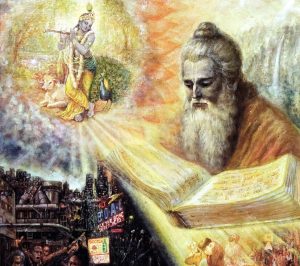 Refuting all of Śaṅkarācārya’s concepts, Jīva Gosvāmī proved that Kṛṣṇa is Parabrahma, the source of Brahman.
Refuting all of Śaṅkarācārya’s concepts, Jīva Gosvāmī proved that Kṛṣṇa is Parabrahma, the source of Brahman.
He also analysed paramātma-tattva, and in the Kṛṣṇa-sandarbha he explained how Kṛṣṇa alone is Svayam Bhagavān. He explained how Kṛṣṇa is sarva-śaktimān, how he is an ocean of rasa, how from him the jīvas and all else emerge and how the jīvas can achieve his eternal association. He refuted the concept that Kṛṣṇa is an incarnation of Nārāyaṇa. Using evidence from the Vedas, Upaniṣads and Purāṇas he established that Kṛṣṇa is Svayam Bhagavān and all other incarnations are his partial expansions. On the basis of scriptural evidence he strengthened Mahāprabhu’s conception, which had been established in literature by Rūpa Gosvāmī and Sanātana Gosvāmī. In doing so, he established our sampradāya upon a firm philosophical foundation. He protected the flowing river of rasa by placing large rocks of siddhānta on both its banks. In that way no contaminated water of misconceptions could ever enter it.
In his Bhakti-sandarbha he explained many subtle aspects of bhakti. He delineated the sixty-four types of bhakti, and he expertly explained guru-tattva. He also explained guru- pādāśraya, the process of taking exclusive shelter of the guru—how it should be done, what are its rules and regulations and so on. The guru will consider the prospective disciple, the disciple will consider the guru, and then a circumstance will never arise within the disciple’s entire life where he will have to abandon his guru. One should not accept a guru whimsically, because to change one’s guru can be very problematic. One should accept a guru in whom he will never lose faith; otherwise there will be a problem. One should make sure that he only accepts a sad-guru, who is detached from sense enjoyment, who is conversant with all tattva and siddhānta, who is rasika, who is spiritually realised and who is affectionate towards him. One should examine the guru carefully, even if this means waiting for as long as one year to ensure that he is qualified. The guru should not be attached to anything within all of material existence. The most common type of attachment is that for money. There are three things: kanaka (gold or wealth), kāminī (women) and pratiṣṭhā (fame). The word kāminī refers to both men’s attachment to women and women’s attachment to men. If we see a guru who is attached to these things, then we should offer praṇāma to him but not accept initiation from him. Otherwise, one will come to know of it later and ask him, “Gurujī, what is the conception of Rūpa Gosvāmī?”
The guru will reply, “I don’t know.” So why accept such a spiritual master? One will ask, “What is acintya-bhedābheda-tattva? What is prema?”
He will say, “I don’t know these things. I just chant harināma.”
“Then I will go to another guru.”
“If you go to another guru, all will be ruined for you.”
Then one will think, “How could I have accepted such a harsh, spiteful guru?” and one’s faith will diminish. So one should examine the spiritual master carefully. There is a saying in Hindi, “pāni pījiye chānkar, guru kījiye  jānkar,” which means, “Please only drink water after filtering it, and please only accept a guru after getting to know him.” One should extensively see and hear the guru first to ensure that he will be the correct guru for life. Otherwise, it will be like what we see going on these days where people go to a particular temple and are initiated the same day. Someone comes for the first time and sees the great opulence, how the temple is worth millions of rupees and that crowds of people come there daily. Then he thinks, “I will become a disciple here, that will be very nice.” Then after a few days of seeing and hearing what is happening there, he understands that it is all adverse to bhakti. Some of the Gosvāmīs who run the mandiras in Vṛndāvana have great wealth and they regularly quarrel over it. Others steal the expensive ornaments that people donate to the deities. What will happen to those who accept initiation from such gurus? Jīva Gosvāmī gave excellent descriptions of both the dīkṣā-guru and the śikṣā-guru. The guru is he who in his own life has established the conduct and line of thought that he preaches. By following the ideal he sets in his conduct, following his instructions and chanting the mantras he gives, one will feel great gratification and his life be fully successful. Could anyone ever leave such a guru?
jānkar,” which means, “Please only drink water after filtering it, and please only accept a guru after getting to know him.” One should extensively see and hear the guru first to ensure that he will be the correct guru for life. Otherwise, it will be like what we see going on these days where people go to a particular temple and are initiated the same day. Someone comes for the first time and sees the great opulence, how the temple is worth millions of rupees and that crowds of people come there daily. Then he thinks, “I will become a disciple here, that will be very nice.” Then after a few days of seeing and hearing what is happening there, he understands that it is all adverse to bhakti. Some of the Gosvāmīs who run the mandiras in Vṛndāvana have great wealth and they regularly quarrel over it. Others steal the expensive ornaments that people donate to the deities. What will happen to those who accept initiation from such gurus? Jīva Gosvāmī gave excellent descriptions of both the dīkṣā-guru and the śikṣā-guru. The guru is he who in his own life has established the conduct and line of thought that he preaches. By following the ideal he sets in his conduct, following his instructions and chanting the mantras he gives, one will feel great gratification and his life be fully successful. Could anyone ever leave such a guru?
Jīva Gosvāmī also explained that all bhakti is not the same, just as all varieties of water are not one and the same. There is clean water, purified water, contaminated water, sewage water and so forth. Just behind our mandira here in Mathurā flows a river of sewage—so this is water, is it not? Are all types of water the same? Similarly there are different varieties of bhakti, but not knowing this people in general accept the impure practice of devotion as bhakti. To rectify this Jīva Gosvāmī described three varieties of bhakti: āropa-siddhā bhakti, saṅga-siddhā bhakti and svarūpa-siddhā bhakti. Some people take initiation from a guru but don’t associate with the guru. When you ask such a person who is his guru, he will proudly reply, “Jagad-guru such-and-such.”
“What are his instructions?”
“He gave me a mantra to chant—kṛṣṇaṁ śaraṇaṁ mama.”
“What else?”
“Nothing else.”
“How many demigods do you worship?”
“Oh, as many as there are in India.”
Ask another man, “Whose disciple are you?”
“I am a disciple of Śrīla Bhaktisiddhānta Sarasvatī Ṭhākura.”
“What do you practise?”
“Oh, he gave me a mantra to chant but I can’t remember what it is.”
So did this person really become a disciple or not? He says he worships Rādhā-Kṛṣṇa, but he can’t remember the mantra. So what benefit will there be for him? So people in conditions like this accept that which is not bhakti 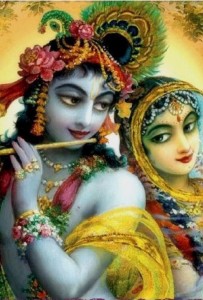 to be bhakti. They respect all the demigods as being on the same level and don’t recognise the superiority of Rādhā-Kṛṣṇa. Some people consider their activities for the mundane welfare of society to be bhakti, and this is āropa-siddhā bhakti.
to be bhakti. They respect all the demigods as being on the same level and don’t recognise the superiority of Rādhā-Kṛṣṇa. Some people consider their activities for the mundane welfare of society to be bhakti, and this is āropa-siddhā bhakti.
Jīva Gosvāmī examined all these issues in-depth in his sandarbhas. Until one has read these books, he won’t be able to understand the true nature of bhakti. By regularly hearing the knowledge delineated in them and by associating with advanced Vaiṣṇavas, one’s bhakti will gradually become uttamā-bhakti. One by one he described at length the five types of prema (śānta, dāsya and so on), and especially he emphasised gopī-prema and explained the sādhana for achieving it. Much of this came in Gopāla-campū; it is a very philosophical book that is simply not of this world. He sat down right there in Goloka-Vṛndāvana and wrote it, and then gave it to this world. He composed so much literature, and we could spend this entire birth immersed in reading them. In practising the sādhana prescribed by them, who knows how many lives we could spend! If we endeavour to enter into these books and if we examine both the personal conduct and conceptions of Jīva Gosvāmī and try to follow them ourselves, our spiritual lives will certainly be successful. May Jīva Gosvāmī be merciful upon us so we can learn all his instructions and begin to perform bhajana purely.
Image/Art made possible by Pixabay.com & Krishnapath.org








